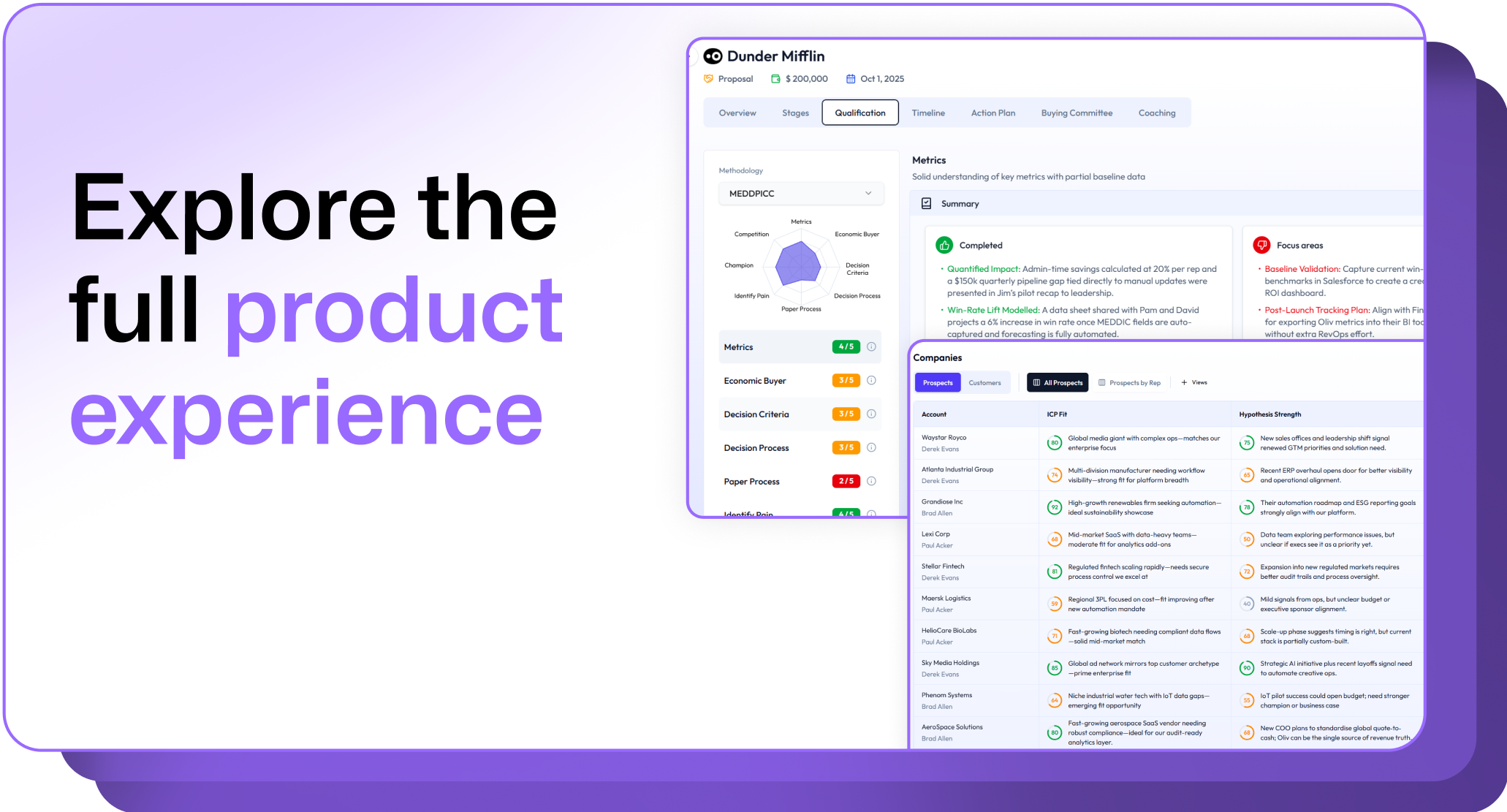In sales, every team member brings something special to the table. Some have a way with numbers that can tell you the whole story at a glance, while others have a way to turn a “maybe” into a “yes”. Bringing these strengths together is when your team really starts to go beyond just closing deals - building loyal customers that turn into advocates.
‘Sales team collaboration’ is more than a buzzword—it's the secret of a successful sales force. Sure, everyone talks about teamwork, but it's not just about knowing – it's about actually doing it well.
Unlocking the full potential of a sales team requires attention to the joint effort of all members. Sales team collaboration fosters a shared understanding of goals, encourages knowledge sharing, and cultivates a culture of success that operates beyond individual achievements.
In the competitive world of sales, the adage "two heads are better than one" couldn't be more apt. Sales team collaboration is the pathway to not just meeting quotas but exceeding them. It focusses on harnessing the collective skills, experiences, and insights of each team member to close more deals and drive growth. The key is to build a framework that facilitates seamless interaction, ensures all voices are heard, and steers the team toward common objectives.
What creates silos that hinder sales teams’ performance
Silos are like invisible barriers between different departments or team members when they don't talk or work together enough. Silos can pop up because of a lot of things—maybe it's an unclear goal, or perhaps it's just that some team members are using different tools to track their sales leads. Sometimes, it's even down to geography, like when team members are spread across different locations.
Silos stop people from sharing ideas, make customers unhappy, and can mess up even the best plans. It's like trying to finish a puzzle but you've got to search for the pieces all over the house.
To prevent silos from cropping up, some basic practices should be followed:
- Set clear, shared goals for everyone to aim for.
- Keep communication open with regular updates and check-ins.
- Use the same tools and systems, like a unified CRM, to keep info in one place.
- Have team members from different groups work together on projects.
- Celebrate wins as a team, so everyone feels part of the success.
Breaking down these hidden walls is crucial for better teamwork. It helps everyone share ideas more easily, work together smoothly, and create a better experience for the customer. By knocking down these barriers, we pave the way for stronger collaboration. Let’s explore practical strategies that can improve how we work together as a team.
Ways to improve sales team collaboration
1. Bridging communication gaps
Clear lines of communication establish the groundwork for effective sales team collaboration. Sales reps and managers must be on the same page, utilizing tools like Slack or Microsoft Teams to streamline interactions.
With salespeople often on the move, communication can become fragmented. To prevent this, establish a protocol for communication. It could be a daily huddle or a dynamic group chat where updates are shared frequently.
Real-life example: At ABC Tech, a shift to a centralized messaging app reduced email clutter by 30% and boosted call prep efficiency significantly.
Tips for effective sales communication:
- Implement a unified communication tool.
- Hold brief daily stand-up meetings.
- Encourage sharing of wins and losses for collective learning.
2. Centralized information systems
Resource sharing through CRM systems like Salesforce ensures that all team members have the latest information at their fingertips. Ideally, CRM systems should integrate with communication platforms for real-time updates.
A centralized platform keeps everyone up-to-date on the latest developments. The CRM should act as the single source of truth for client interactions, deal stages, and key metrics. Example: XYZ Corp integrated its CRM with real-time dashboards, resulting in a 25% uptick in data-driven decision-making.
How to leverage your CRM
- Ensure your CRM reflects real-time data.
- Train team members thoroughly on CRM usage.
- Set up automated alerts for deal updates.
3. Use common tools for consistency across team
Tools like Oliv can revolutionize sales team collaboration by providing live guidance, recording calls, summarizing them, and syncing information directly to the CRM.
Embrace tools like Oliv that help in making each moment on a sales call count. Such tools offer on-the-spot guidance, ensuring not a single critical point is missed. For instance, during a product demo, Oliv might nudge the salesperson to highlight a feature the prospect showed interest in during a previous interaction.
Maximizing technology use:
- Integrate AI tools with your call systems.
- Use post-call analytics to improve future performances.
- Let technology aid in follow-up scheduling and task management.
4. Structuring collaborative meetings
Regularly scheduled meetings keep team members aligned. However, these should be strategic, avoiding the pitfall of meeting overload. Use tools like Doodle or When2meet to schedule meetings effectively.
Meetings should be concise, objective-driven and regularly spaced to keep the team aligned without causing fatigue. Utilize scheduling tools and stick to an agenda. Case in point: DEF Inc. reduced its weekly meeting time by 40% while increasing actionable outcomes by using focused agendas.
Conducting effective meetings:
- Keep meetings short and agenda-specific.
- Rotate meeting leaders for diverse inputs.
- Use collaborative documents for real-time note-taking.
5. Role of sales managers
Sales managers play a crucial role by not just overseeing operations but also guiding and facilitating sales team collaboration. Managers are responsible for fostering an environment of trust and shared responsibility.
The manager is the glue that holds the team together, ensuring that everyone is playing their part effectively. Their role extends from administrative to supportive, being a mentor as much as a leader. Great managers create an environment where the team isn't afraid to take risks or share bold ideas.
Ways managers can boost collaboration:
- Foster an inclusive and supportive environment.
- Provide regular, constructive feedback.
- Offer opportunities for team members to lead initiatives.
6. Encouraging shared learning
Mentoring programs and collaborative learning sessions provide a platform for sharing strategies and tactics that have proven successful.
Create a repository of best practices, success stories, and lessons learned that team members can access. Encourage peer-to-peer training sessions. Salesforce at GHI Ltd. attributed a 15% increase in closing rates to its peer mentoring program.
Creating a knowledge-sharing ecosystem:
- Establish regular 'knowledge transfer' sessions.
- Reward team members who contribute valuable insights.
- Document and disseminate successful sales tactics.
7. Assessing and adapting
Continuous assessment through data analysis helps the team understand their collaborative efforts' effectiveness. Tools like Tableau can illustrate sales patterns and areas for improvement.
Use analytics tools to measure the effectiveness of your collaborative efforts. Organize quarterly reviews to see where the team excels and where there is room for improvement. Analytics helped JKL Services recognize a gap in product knowledge that was affecting sales, leading to targeted training sessions.
Assessment tips:
- Use visual analytics tools for better interpretation.
- Set clear metrics for measuring collaboration.
- Regularly review and adjust strategies based on data.
8. Fostering a culture of feedback
Open channels for feedback encourage a proactive approach to enhancing sales team collaboration. It can be as simple as having a virtual suggestion box or regular one-on-one check-ins.
Encourage a feedback-rich culture where suggestions are welcomed, and constructive criticism is seen as a growth opportunity. This includes not just peer-to-peer feedback but also upward and downward within the organization. At MNO Company, a monthly “Feedback Fest” led to process improvements that significantly increased customer satisfaction.
Building feedback channels:
- Conduct regular feedback sessions.
- Create an anonymous feedback system.
- Act on the feedback to show it's valued.
By deepening the collaborative processes with these practices, sales teams can transform the way they operate, ensuring that their concerted efforts lead to outstanding results. Remember, success in sales is not just about the individual; it's the power of the team working in harmony that ultimately seals the deal.
Through careful attention to communication, leveraging the right technology, and fostering a supportive culture, sales team collaboration can reach new heights. Remember, collaboration is about people working together to win together.
Overcoming challenges in sales collaboration
Ever been caught in a sales team dispute? But get this: those clashes might just be the key to boosting teamwork! Which is why conflict resolution is pivotal. Disputes are inevitable, but when resolved positively, they can lead to stronger bonds and better processes. Establish a conflict resolution framework that promotes understanding and finds solutions that align with team goals.
1. Communication breakdowns
In the fast-paced world of sales, miscommunication can be a real deal-breaker. But fret not! Keep those lines of communication wide open. Whether it's through regular team meetings, quick check-ins, or even a good old-fashioned chat, staying connected is key.
Tips to overcome the challenge:
- Schedule regular team meetings to ensure everyone is on the same page.
- Encourage open communication channels for quick check-ins and updates.
- Foster a culture where team members feel comfortable asking questions and seeking clarification.
2. Tech troubles
Technology is a blessing and a curse, am I right? From bad Wi-Fi to glitchy software, tech troubles can throw a serious wrench in your collaboration plans. But fear not! Embrace tech solutions that actually work for your team. Whether it's a slick CRM system or a trusty project management tool, find what fits your needs and stick with it.
Tips to overcome the challenge:
- Invest in reliable technology solutions tailored to your team's needs.
- Provide training and support to ensure team members are proficient in using tech tools.
- Regularly assess and update technology infrastructure to keep pace with evolving needs.
3. Personality clashes
Personality clashes can put a serious damper on team morale and productivity. But here's the thing – diversity is what makes us stronger! Embrace different perspectives, find common ground, and remember to always lead with empathy.
Tips to overcome the challenge:
- Foster a culture of respect and inclusivity where diverse viewpoints are valued.
- Encourage open dialogue and constructive feedback to address conflicts promptly.
- Provide training on effective communication and conflict resolution techniques.
4. Poor time management
Time management can be a real issue, especially in sales. But fear not! Set clear priorities to enhance productivity, break down tasks into manageable chunks, and don't be afraid to delegate when needed. Remember, Rome wasn't built in a day!
Tips to overcome the challenge:
- Prioritize tasks based on urgency and importance to focus on high-value activities.
- Break down complex projects into smaller, achievable milestones to track progress.
- Delegate tasks effectively by leveraging team strengths and expertise.
Summary
Teamwork in sales isn't just about getting stuff done – it is the very essence of a thriving sales environment. We've talked about some key things that make teamwork rock, like keeping everyone on the same page with Oliv and having awesome communication. And guess what? It's all about winning together!
But here's the deal: sales and teamwork are always changing. That means we've gotta stay sharp. Teams that keep up with what's new in the sales world, like reading up on team tips from Harvard Business Review on team dynamics or checking out the latest sales collaboration tools from Gartner, are the ones who really stand out.
Now, let's hit pause and remember why teamwork matters: it's all about making a space where everyone can shine. That's how we hit our goals like pros and become a real force in the market.
In sales, every team member brings something special to the table. Some have a way with numbers that can tell you the whole story at a glance, while others have a way to turn a “maybe” into a “yes”. Bringing these strengths together is when your team really starts to go beyond just closing deals - building loyal customers that turn into advocates.
‘Sales team collaboration’ is more than a buzzword—it's the secret of a successful sales force. Sure, everyone talks about teamwork, but it's not just about knowing – it's about actually doing it well.
Unlocking the full potential of a sales team requires attention to the joint effort of all members. Sales team collaboration fosters a shared understanding of goals, encourages knowledge sharing, and cultivates a culture of success that operates beyond individual achievements.
In the competitive world of sales, the adage "two heads are better than one" couldn't be more apt. Sales team collaboration is the pathway to not just meeting quotas but exceeding them. It focusses on harnessing the collective skills, experiences, and insights of each team member to close more deals and drive growth. The key is to build a framework that facilitates seamless interaction, ensures all voices are heard, and steers the team toward common objectives.
What creates silos that hinder sales teams’ performance
Silos are like invisible barriers between different departments or team members when they don't talk or work together enough. Silos can pop up because of a lot of things—maybe it's an unclear goal, or perhaps it's just that some team members are using different tools to track their sales leads. Sometimes, it's even down to geography, like when team members are spread across different locations.
Silos stop people from sharing ideas, make customers unhappy, and can mess up even the best plans. It's like trying to finish a puzzle but you've got to search for the pieces all over the house.
To prevent silos from cropping up, some basic practices should be followed:
- Set clear, shared goals for everyone to aim for.
- Keep communication open with regular updates and check-ins.
- Use the same tools and systems, like a unified CRM, to keep info in one place.
- Have team members from different groups work together on projects.
- Celebrate wins as a team, so everyone feels part of the success.
Breaking down these hidden walls is crucial for better teamwork. It helps everyone share ideas more easily, work together smoothly, and create a better experience for the customer. By knocking down these barriers, we pave the way for stronger collaboration. Let’s explore practical strategies that can improve how we work together as a team.
Ways to improve sales team collaboration
1. Bridging communication gaps
Clear lines of communication establish the groundwork for effective sales team collaboration. Sales reps and managers must be on the same page, utilizing tools like Slack or Microsoft Teams to streamline interactions.
With salespeople often on the move, communication can become fragmented. To prevent this, establish a protocol for communication. It could be a daily huddle or a dynamic group chat where updates are shared frequently.
Real-life example: At ABC Tech, a shift to a centralized messaging app reduced email clutter by 30% and boosted call prep efficiency significantly.
Tips for effective sales communication:
- Implement a unified communication tool.
- Hold brief daily stand-up meetings.
- Encourage sharing of wins and losses for collective learning.
2. Centralized information systems
Resource sharing through CRM systems like Salesforce ensures that all team members have the latest information at their fingertips. Ideally, CRM systems should integrate with communication platforms for real-time updates.
A centralized platform keeps everyone up-to-date on the latest developments. The CRM should act as the single source of truth for client interactions, deal stages, and key metrics. Example: XYZ Corp integrated its CRM with real-time dashboards, resulting in a 25% uptick in data-driven decision-making.
How to leverage your CRM
- Ensure your CRM reflects real-time data.
- Train team members thoroughly on CRM usage.
- Set up automated alerts for deal updates.
3. Use common tools for consistency across team
Tools like Oliv can revolutionize sales team collaboration by providing live guidance, recording calls, summarizing them, and syncing information directly to the CRM.
Embrace tools like Oliv that help in making each moment on a sales call count. Such tools offer on-the-spot guidance, ensuring not a single critical point is missed. For instance, during a product demo, Oliv might nudge the salesperson to highlight a feature the prospect showed interest in during a previous interaction.
Maximizing technology use:
- Integrate AI tools with your call systems.
- Use post-call analytics to improve future performances.
- Let technology aid in follow-up scheduling and task management.
4. Structuring collaborative meetings
Regularly scheduled meetings keep team members aligned. However, these should be strategic, avoiding the pitfall of meeting overload. Use tools like Doodle or When2meet to schedule meetings effectively.
Meetings should be concise, objective-driven and regularly spaced to keep the team aligned without causing fatigue. Utilize scheduling tools and stick to an agenda. Case in point: DEF Inc. reduced its weekly meeting time by 40% while increasing actionable outcomes by using focused agendas.
Conducting effective meetings:
- Keep meetings short and agenda-specific.
- Rotate meeting leaders for diverse inputs.
- Use collaborative documents for real-time note-taking.
5. Role of sales managers
Sales managers play a crucial role by not just overseeing operations but also guiding and facilitating sales team collaboration. Managers are responsible for fostering an environment of trust and shared responsibility.
The manager is the glue that holds the team together, ensuring that everyone is playing their part effectively. Their role extends from administrative to supportive, being a mentor as much as a leader. Great managers create an environment where the team isn't afraid to take risks or share bold ideas.
Ways managers can boost collaboration:
- Foster an inclusive and supportive environment.
- Provide regular, constructive feedback.
- Offer opportunities for team members to lead initiatives.
6. Encouraging shared learning
Mentoring programs and collaborative learning sessions provide a platform for sharing strategies and tactics that have proven successful.
Create a repository of best practices, success stories, and lessons learned that team members can access. Encourage peer-to-peer training sessions. Salesforce at GHI Ltd. attributed a 15% increase in closing rates to its peer mentoring program.
Creating a knowledge-sharing ecosystem:
- Establish regular 'knowledge transfer' sessions.
- Reward team members who contribute valuable insights.
- Document and disseminate successful sales tactics.
7. Assessing and adapting
Continuous assessment through data analysis helps the team understand their collaborative efforts' effectiveness. Tools like Tableau can illustrate sales patterns and areas for improvement.
Use analytics tools to measure the effectiveness of your collaborative efforts. Organize quarterly reviews to see where the team excels and where there is room for improvement. Analytics helped JKL Services recognize a gap in product knowledge that was affecting sales, leading to targeted training sessions.
Assessment tips:
- Use visual analytics tools for better interpretation.
- Set clear metrics for measuring collaboration.
- Regularly review and adjust strategies based on data.
8. Fostering a culture of feedback
Open channels for feedback encourage a proactive approach to enhancing sales team collaboration. It can be as simple as having a virtual suggestion box or regular one-on-one check-ins.
Encourage a feedback-rich culture where suggestions are welcomed, and constructive criticism is seen as a growth opportunity. This includes not just peer-to-peer feedback but also upward and downward within the organization. At MNO Company, a monthly “Feedback Fest” led to process improvements that significantly increased customer satisfaction.
Building feedback channels:
- Conduct regular feedback sessions.
- Create an anonymous feedback system.
- Act on the feedback to show it's valued.
By deepening the collaborative processes with these practices, sales teams can transform the way they operate, ensuring that their concerted efforts lead to outstanding results. Remember, success in sales is not just about the individual; it's the power of the team working in harmony that ultimately seals the deal.
Through careful attention to communication, leveraging the right technology, and fostering a supportive culture, sales team collaboration can reach new heights. Remember, collaboration is about people working together to win together.
Overcoming challenges in sales collaboration
Ever been caught in a sales team dispute? But get this: those clashes might just be the key to boosting teamwork! Which is why conflict resolution is pivotal. Disputes are inevitable, but when resolved positively, they can lead to stronger bonds and better processes. Establish a conflict resolution framework that promotes understanding and finds solutions that align with team goals.
1. Communication breakdowns
In the fast-paced world of sales, miscommunication can be a real deal-breaker. But fret not! Keep those lines of communication wide open. Whether it's through regular team meetings, quick check-ins, or even a good old-fashioned chat, staying connected is key.
Tips to overcome the challenge:
- Schedule regular team meetings to ensure everyone is on the same page.
- Encourage open communication channels for quick check-ins and updates.
- Foster a culture where team members feel comfortable asking questions and seeking clarification.
2. Tech troubles
Technology is a blessing and a curse, am I right? From bad Wi-Fi to glitchy software, tech troubles can throw a serious wrench in your collaboration plans. But fear not! Embrace tech solutions that actually work for your team. Whether it's a slick CRM system or a trusty project management tool, find what fits your needs and stick with it.
Tips to overcome the challenge:
- Invest in reliable technology solutions tailored to your team's needs.
- Provide training and support to ensure team members are proficient in using tech tools.
- Regularly assess and update technology infrastructure to keep pace with evolving needs.
3. Personality clashes
Personality clashes can put a serious damper on team morale and productivity. But here's the thing – diversity is what makes us stronger! Embrace different perspectives, find common ground, and remember to always lead with empathy.
Tips to overcome the challenge:
- Foster a culture of respect and inclusivity where diverse viewpoints are valued.
- Encourage open dialogue and constructive feedback to address conflicts promptly.
- Provide training on effective communication and conflict resolution techniques.
4. Poor time management
Time management can be a real issue, especially in sales. But fear not! Set clear priorities to enhance productivity, break down tasks into manageable chunks, and don't be afraid to delegate when needed. Remember, Rome wasn't built in a day!
Tips to overcome the challenge:
- Prioritize tasks based on urgency and importance to focus on high-value activities.
- Break down complex projects into smaller, achievable milestones to track progress.
- Delegate tasks effectively by leveraging team strengths and expertise.
Summary
Teamwork in sales isn't just about getting stuff done – it is the very essence of a thriving sales environment. We've talked about some key things that make teamwork rock, like keeping everyone on the same page with Oliv and having awesome communication. And guess what? It's all about winning together!
But here's the deal: sales and teamwork are always changing. That means we've gotta stay sharp. Teams that keep up with what's new in the sales world, like reading up on team tips from Harvard Business Review on team dynamics or checking out the latest sales collaboration tools from Gartner, are the ones who really stand out.
Now, let's hit pause and remember why teamwork matters: it's all about making a space where everyone can shine. That's how we hit our goals like pros and become a real force in the market.
In sales, every team member brings something special to the table. Some have a way with numbers that can tell you the whole story at a glance, while others have a way to turn a “maybe” into a “yes”. Bringing these strengths together is when your team really starts to go beyond just closing deals - building loyal customers that turn into advocates.
‘Sales team collaboration’ is more than a buzzword—it's the secret of a successful sales force. Sure, everyone talks about teamwork, but it's not just about knowing – it's about actually doing it well.
Unlocking the full potential of a sales team requires attention to the joint effort of all members. Sales team collaboration fosters a shared understanding of goals, encourages knowledge sharing, and cultivates a culture of success that operates beyond individual achievements.
In the competitive world of sales, the adage "two heads are better than one" couldn't be more apt. Sales team collaboration is the pathway to not just meeting quotas but exceeding them. It focusses on harnessing the collective skills, experiences, and insights of each team member to close more deals and drive growth. The key is to build a framework that facilitates seamless interaction, ensures all voices are heard, and steers the team toward common objectives.
What creates silos that hinder sales teams’ performance
Silos are like invisible barriers between different departments or team members when they don't talk or work together enough. Silos can pop up because of a lot of things—maybe it's an unclear goal, or perhaps it's just that some team members are using different tools to track their sales leads. Sometimes, it's even down to geography, like when team members are spread across different locations.
Silos stop people from sharing ideas, make customers unhappy, and can mess up even the best plans. It's like trying to finish a puzzle but you've got to search for the pieces all over the house.
To prevent silos from cropping up, some basic practices should be followed:
- Set clear, shared goals for everyone to aim for.
- Keep communication open with regular updates and check-ins.
- Use the same tools and systems, like a unified CRM, to keep info in one place.
- Have team members from different groups work together on projects.
- Celebrate wins as a team, so everyone feels part of the success.
Breaking down these hidden walls is crucial for better teamwork. It helps everyone share ideas more easily, work together smoothly, and create a better experience for the customer. By knocking down these barriers, we pave the way for stronger collaboration. Let’s explore practical strategies that can improve how we work together as a team.
Ways to improve sales team collaboration
1. Bridging communication gaps
Clear lines of communication establish the groundwork for effective sales team collaboration. Sales reps and managers must be on the same page, utilizing tools like Slack or Microsoft Teams to streamline interactions.
With salespeople often on the move, communication can become fragmented. To prevent this, establish a protocol for communication. It could be a daily huddle or a dynamic group chat where updates are shared frequently.
Real-life example: At ABC Tech, a shift to a centralized messaging app reduced email clutter by 30% and boosted call prep efficiency significantly.
Tips for effective sales communication:
- Implement a unified communication tool.
- Hold brief daily stand-up meetings.
- Encourage sharing of wins and losses for collective learning.
2. Centralized information systems
Resource sharing through CRM systems like Salesforce ensures that all team members have the latest information at their fingertips. Ideally, CRM systems should integrate with communication platforms for real-time updates.
A centralized platform keeps everyone up-to-date on the latest developments. The CRM should act as the single source of truth for client interactions, deal stages, and key metrics. Example: XYZ Corp integrated its CRM with real-time dashboards, resulting in a 25% uptick in data-driven decision-making.
How to leverage your CRM
- Ensure your CRM reflects real-time data.
- Train team members thoroughly on CRM usage.
- Set up automated alerts for deal updates.
3. Use common tools for consistency across team
Tools like Oliv can revolutionize sales team collaboration by providing live guidance, recording calls, summarizing them, and syncing information directly to the CRM.
Embrace tools like Oliv that help in making each moment on a sales call count. Such tools offer on-the-spot guidance, ensuring not a single critical point is missed. For instance, during a product demo, Oliv might nudge the salesperson to highlight a feature the prospect showed interest in during a previous interaction.
Maximizing technology use:
- Integrate AI tools with your call systems.
- Use post-call analytics to improve future performances.
- Let technology aid in follow-up scheduling and task management.
4. Structuring collaborative meetings
Regularly scheduled meetings keep team members aligned. However, these should be strategic, avoiding the pitfall of meeting overload. Use tools like Doodle or When2meet to schedule meetings effectively.
Meetings should be concise, objective-driven and regularly spaced to keep the team aligned without causing fatigue. Utilize scheduling tools and stick to an agenda. Case in point: DEF Inc. reduced its weekly meeting time by 40% while increasing actionable outcomes by using focused agendas.
Conducting effective meetings:
- Keep meetings short and agenda-specific.
- Rotate meeting leaders for diverse inputs.
- Use collaborative documents for real-time note-taking.
5. Role of sales managers
Sales managers play a crucial role by not just overseeing operations but also guiding and facilitating sales team collaboration. Managers are responsible for fostering an environment of trust and shared responsibility.
The manager is the glue that holds the team together, ensuring that everyone is playing their part effectively. Their role extends from administrative to supportive, being a mentor as much as a leader. Great managers create an environment where the team isn't afraid to take risks or share bold ideas.
Ways managers can boost collaboration:
- Foster an inclusive and supportive environment.
- Provide regular, constructive feedback.
- Offer opportunities for team members to lead initiatives.
6. Encouraging shared learning
Mentoring programs and collaborative learning sessions provide a platform for sharing strategies and tactics that have proven successful.
Create a repository of best practices, success stories, and lessons learned that team members can access. Encourage peer-to-peer training sessions. Salesforce at GHI Ltd. attributed a 15% increase in closing rates to its peer mentoring program.
Creating a knowledge-sharing ecosystem:
- Establish regular 'knowledge transfer' sessions.
- Reward team members who contribute valuable insights.
- Document and disseminate successful sales tactics.
7. Assessing and adapting
Continuous assessment through data analysis helps the team understand their collaborative efforts' effectiveness. Tools like Tableau can illustrate sales patterns and areas for improvement.
Use analytics tools to measure the effectiveness of your collaborative efforts. Organize quarterly reviews to see where the team excels and where there is room for improvement. Analytics helped JKL Services recognize a gap in product knowledge that was affecting sales, leading to targeted training sessions.
Assessment tips:
- Use visual analytics tools for better interpretation.
- Set clear metrics for measuring collaboration.
- Regularly review and adjust strategies based on data.
8. Fostering a culture of feedback
Open channels for feedback encourage a proactive approach to enhancing sales team collaboration. It can be as simple as having a virtual suggestion box or regular one-on-one check-ins.
Encourage a feedback-rich culture where suggestions are welcomed, and constructive criticism is seen as a growth opportunity. This includes not just peer-to-peer feedback but also upward and downward within the organization. At MNO Company, a monthly “Feedback Fest” led to process improvements that significantly increased customer satisfaction.
Building feedback channels:
- Conduct regular feedback sessions.
- Create an anonymous feedback system.
- Act on the feedback to show it's valued.
By deepening the collaborative processes with these practices, sales teams can transform the way they operate, ensuring that their concerted efforts lead to outstanding results. Remember, success in sales is not just about the individual; it's the power of the team working in harmony that ultimately seals the deal.
Through careful attention to communication, leveraging the right technology, and fostering a supportive culture, sales team collaboration can reach new heights. Remember, collaboration is about people working together to win together.
Overcoming challenges in sales collaboration
Ever been caught in a sales team dispute? But get this: those clashes might just be the key to boosting teamwork! Which is why conflict resolution is pivotal. Disputes are inevitable, but when resolved positively, they can lead to stronger bonds and better processes. Establish a conflict resolution framework that promotes understanding and finds solutions that align with team goals.
1. Communication breakdowns
In the fast-paced world of sales, miscommunication can be a real deal-breaker. But fret not! Keep those lines of communication wide open. Whether it's through regular team meetings, quick check-ins, or even a good old-fashioned chat, staying connected is key.
Tips to overcome the challenge:
- Schedule regular team meetings to ensure everyone is on the same page.
- Encourage open communication channels for quick check-ins and updates.
- Foster a culture where team members feel comfortable asking questions and seeking clarification.
2. Tech troubles
Technology is a blessing and a curse, am I right? From bad Wi-Fi to glitchy software, tech troubles can throw a serious wrench in your collaboration plans. But fear not! Embrace tech solutions that actually work for your team. Whether it's a slick CRM system or a trusty project management tool, find what fits your needs and stick with it.
Tips to overcome the challenge:
- Invest in reliable technology solutions tailored to your team's needs.
- Provide training and support to ensure team members are proficient in using tech tools.
- Regularly assess and update technology infrastructure to keep pace with evolving needs.
3. Personality clashes
Personality clashes can put a serious damper on team morale and productivity. But here's the thing – diversity is what makes us stronger! Embrace different perspectives, find common ground, and remember to always lead with empathy.
Tips to overcome the challenge:
- Foster a culture of respect and inclusivity where diverse viewpoints are valued.
- Encourage open dialogue and constructive feedback to address conflicts promptly.
- Provide training on effective communication and conflict resolution techniques.
4. Poor time management
Time management can be a real issue, especially in sales. But fear not! Set clear priorities to enhance productivity, break down tasks into manageable chunks, and don't be afraid to delegate when needed. Remember, Rome wasn't built in a day!
Tips to overcome the challenge:
- Prioritize tasks based on urgency and importance to focus on high-value activities.
- Break down complex projects into smaller, achievable milestones to track progress.
- Delegate tasks effectively by leveraging team strengths and expertise.
Summary
Teamwork in sales isn't just about getting stuff done – it is the very essence of a thriving sales environment. We've talked about some key things that make teamwork rock, like keeping everyone on the same page with Oliv and having awesome communication. And guess what? It's all about winning together!
But here's the deal: sales and teamwork are always changing. That means we've gotta stay sharp. Teams that keep up with what's new in the sales world, like reading up on team tips from Harvard Business Review on team dynamics or checking out the latest sales collaboration tools from Gartner, are the ones who really stand out.
Now, let's hit pause and remember why teamwork matters: it's all about making a space where everyone can shine. That's how we hit our goals like pros and become a real force in the market.
In sales, every team member brings something special to the table. Some have a way with numbers that can tell you the whole story at a glance, while others have a way to turn a “maybe” into a “yes”. Bringing these strengths together is when your team really starts to go beyond just closing deals - building loyal customers that turn into advocates.
‘Sales team collaboration’ is more than a buzzword—it's the secret of a successful sales force. Sure, everyone talks about teamwork, but it's not just about knowing – it's about actually doing it well.
Unlocking the full potential of a sales team requires attention to the joint effort of all members. Sales team collaboration fosters a shared understanding of goals, encourages knowledge sharing, and cultivates a culture of success that operates beyond individual achievements.
In the competitive world of sales, the adage "two heads are better than one" couldn't be more apt. Sales team collaboration is the pathway to not just meeting quotas but exceeding them. It focusses on harnessing the collective skills, experiences, and insights of each team member to close more deals and drive growth. The key is to build a framework that facilitates seamless interaction, ensures all voices are heard, and steers the team toward common objectives.
What creates silos that hinder sales teams’ performance
Silos are like invisible barriers between different departments or team members when they don't talk or work together enough. Silos can pop up because of a lot of things—maybe it's an unclear goal, or perhaps it's just that some team members are using different tools to track their sales leads. Sometimes, it's even down to geography, like when team members are spread across different locations.
Silos stop people from sharing ideas, make customers unhappy, and can mess up even the best plans. It's like trying to finish a puzzle but you've got to search for the pieces all over the house.
To prevent silos from cropping up, some basic practices should be followed:
- Set clear, shared goals for everyone to aim for.
- Keep communication open with regular updates and check-ins.
- Use the same tools and systems, like a unified CRM, to keep info in one place.
- Have team members from different groups work together on projects.
- Celebrate wins as a team, so everyone feels part of the success.
Breaking down these hidden walls is crucial for better teamwork. It helps everyone share ideas more easily, work together smoothly, and create a better experience for the customer. By knocking down these barriers, we pave the way for stronger collaboration. Let’s explore practical strategies that can improve how we work together as a team.
Ways to improve sales team collaboration
1. Bridging communication gaps
Clear lines of communication establish the groundwork for effective sales team collaboration. Sales reps and managers must be on the same page, utilizing tools like Slack or Microsoft Teams to streamline interactions.
With salespeople often on the move, communication can become fragmented. To prevent this, establish a protocol for communication. It could be a daily huddle or a dynamic group chat where updates are shared frequently.
Real-life example: At ABC Tech, a shift to a centralized messaging app reduced email clutter by 30% and boosted call prep efficiency significantly.
Tips for effective sales communication:
- Implement a unified communication tool.
- Hold brief daily stand-up meetings.
- Encourage sharing of wins and losses for collective learning.
2. Centralized information systems
Resource sharing through CRM systems like Salesforce ensures that all team members have the latest information at their fingertips. Ideally, CRM systems should integrate with communication platforms for real-time updates.
A centralized platform keeps everyone up-to-date on the latest developments. The CRM should act as the single source of truth for client interactions, deal stages, and key metrics. Example: XYZ Corp integrated its CRM with real-time dashboards, resulting in a 25% uptick in data-driven decision-making.
How to leverage your CRM
- Ensure your CRM reflects real-time data.
- Train team members thoroughly on CRM usage.
- Set up automated alerts for deal updates.
3. Use common tools for consistency across team
Tools like Oliv can revolutionize sales team collaboration by providing live guidance, recording calls, summarizing them, and syncing information directly to the CRM.
Embrace tools like Oliv that help in making each moment on a sales call count. Such tools offer on-the-spot guidance, ensuring not a single critical point is missed. For instance, during a product demo, Oliv might nudge the salesperson to highlight a feature the prospect showed interest in during a previous interaction.
Maximizing technology use:
- Integrate AI tools with your call systems.
- Use post-call analytics to improve future performances.
- Let technology aid in follow-up scheduling and task management.
4. Structuring collaborative meetings
Regularly scheduled meetings keep team members aligned. However, these should be strategic, avoiding the pitfall of meeting overload. Use tools like Doodle or When2meet to schedule meetings effectively.
Meetings should be concise, objective-driven and regularly spaced to keep the team aligned without causing fatigue. Utilize scheduling tools and stick to an agenda. Case in point: DEF Inc. reduced its weekly meeting time by 40% while increasing actionable outcomes by using focused agendas.
Conducting effective meetings:
- Keep meetings short and agenda-specific.
- Rotate meeting leaders for diverse inputs.
- Use collaborative documents for real-time note-taking.
5. Role of sales managers
Sales managers play a crucial role by not just overseeing operations but also guiding and facilitating sales team collaboration. Managers are responsible for fostering an environment of trust and shared responsibility.
The manager is the glue that holds the team together, ensuring that everyone is playing their part effectively. Their role extends from administrative to supportive, being a mentor as much as a leader. Great managers create an environment where the team isn't afraid to take risks or share bold ideas.
Ways managers can boost collaboration:
- Foster an inclusive and supportive environment.
- Provide regular, constructive feedback.
- Offer opportunities for team members to lead initiatives.
6. Encouraging shared learning
Mentoring programs and collaborative learning sessions provide a platform for sharing strategies and tactics that have proven successful.
Create a repository of best practices, success stories, and lessons learned that team members can access. Encourage peer-to-peer training sessions. Salesforce at GHI Ltd. attributed a 15% increase in closing rates to its peer mentoring program.
Creating a knowledge-sharing ecosystem:
- Establish regular 'knowledge transfer' sessions.
- Reward team members who contribute valuable insights.
- Document and disseminate successful sales tactics.
7. Assessing and adapting
Continuous assessment through data analysis helps the team understand their collaborative efforts' effectiveness. Tools like Tableau can illustrate sales patterns and areas for improvement.
Use analytics tools to measure the effectiveness of your collaborative efforts. Organize quarterly reviews to see where the team excels and where there is room for improvement. Analytics helped JKL Services recognize a gap in product knowledge that was affecting sales, leading to targeted training sessions.
Assessment tips:
- Use visual analytics tools for better interpretation.
- Set clear metrics for measuring collaboration.
- Regularly review and adjust strategies based on data.
8. Fostering a culture of feedback
Open channels for feedback encourage a proactive approach to enhancing sales team collaboration. It can be as simple as having a virtual suggestion box or regular one-on-one check-ins.
Encourage a feedback-rich culture where suggestions are welcomed, and constructive criticism is seen as a growth opportunity. This includes not just peer-to-peer feedback but also upward and downward within the organization. At MNO Company, a monthly “Feedback Fest” led to process improvements that significantly increased customer satisfaction.
Building feedback channels:
- Conduct regular feedback sessions.
- Create an anonymous feedback system.
- Act on the feedback to show it's valued.
By deepening the collaborative processes with these practices, sales teams can transform the way they operate, ensuring that their concerted efforts lead to outstanding results. Remember, success in sales is not just about the individual; it's the power of the team working in harmony that ultimately seals the deal.
Through careful attention to communication, leveraging the right technology, and fostering a supportive culture, sales team collaboration can reach new heights. Remember, collaboration is about people working together to win together.
Overcoming challenges in sales collaboration
Ever been caught in a sales team dispute? But get this: those clashes might just be the key to boosting teamwork! Which is why conflict resolution is pivotal. Disputes are inevitable, but when resolved positively, they can lead to stronger bonds and better processes. Establish a conflict resolution framework that promotes understanding and finds solutions that align with team goals.
1. Communication breakdowns
In the fast-paced world of sales, miscommunication can be a real deal-breaker. But fret not! Keep those lines of communication wide open. Whether it's through regular team meetings, quick check-ins, or even a good old-fashioned chat, staying connected is key.
Tips to overcome the challenge:
- Schedule regular team meetings to ensure everyone is on the same page.
- Encourage open communication channels for quick check-ins and updates.
- Foster a culture where team members feel comfortable asking questions and seeking clarification.
2. Tech troubles
Technology is a blessing and a curse, am I right? From bad Wi-Fi to glitchy software, tech troubles can throw a serious wrench in your collaboration plans. But fear not! Embrace tech solutions that actually work for your team. Whether it's a slick CRM system or a trusty project management tool, find what fits your needs and stick with it.
Tips to overcome the challenge:
- Invest in reliable technology solutions tailored to your team's needs.
- Provide training and support to ensure team members are proficient in using tech tools.
- Regularly assess and update technology infrastructure to keep pace with evolving needs.
3. Personality clashes
Personality clashes can put a serious damper on team morale and productivity. But here's the thing – diversity is what makes us stronger! Embrace different perspectives, find common ground, and remember to always lead with empathy.
Tips to overcome the challenge:
- Foster a culture of respect and inclusivity where diverse viewpoints are valued.
- Encourage open dialogue and constructive feedback to address conflicts promptly.
- Provide training on effective communication and conflict resolution techniques.
4. Poor time management
Time management can be a real issue, especially in sales. But fear not! Set clear priorities to enhance productivity, break down tasks into manageable chunks, and don't be afraid to delegate when needed. Remember, Rome wasn't built in a day!
Tips to overcome the challenge:
- Prioritize tasks based on urgency and importance to focus on high-value activities.
- Break down complex projects into smaller, achievable milestones to track progress.
- Delegate tasks effectively by leveraging team strengths and expertise.
Summary
Teamwork in sales isn't just about getting stuff done – it is the very essence of a thriving sales environment. We've talked about some key things that make teamwork rock, like keeping everyone on the same page with Oliv and having awesome communication. And guess what? It's all about winning together!
But here's the deal: sales and teamwork are always changing. That means we've gotta stay sharp. Teams that keep up with what's new in the sales world, like reading up on team tips from Harvard Business Review on team dynamics or checking out the latest sales collaboration tools from Gartner, are the ones who really stand out.
Now, let's hit pause and remember why teamwork matters: it's all about making a space where everyone can shine. That's how we hit our goals like pros and become a real force in the market.












.png)
.png)
.png)
.png)

